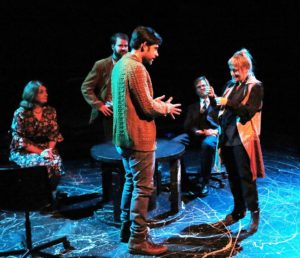
by Mike Hoban
Winter Solstice – Written by Roland Schimmelpfennig; Translated by David Tushingham; Directed by Brooks Reeves; Sound Design by David Reiffel; Costumes by Elizabeth Rocha; Set and Lighting Design by Danielle Fauteux Jacques. Presented by the Apollinaire Theatre Company, Chelsea Theatre Works, 189 Winnisimmet St., Chelsea through Mar. 11
When I was younger, many of my left-leaning friends and acquaintances would casually throw out the word ‘fascist’ to describe an authority figure or institution whose opinions or policies differed from what we thought was right. Later, during the Obama years, those on the far right would casually refer to the president as a Nazi – usually for something like wanting to pass Obamacare and theoretically take away people’s right to choose their own doctors. The inappropriate application of such extreme terms in both cases has served to greatly diminish the former effectiveness of these terms when it comes to calling out what is now going on politically in the U.S. and globally – the rise in increasingly aggressive neo-fascist activism and its subsequent effect on governing bodies. This has not happened overnight, but instead has been a creeping contagion that is slowly being normalized in all forms of media – whether intentionally or unintentionally – and the idea that “It Can’t Happen Here,” is being debunked on an almost daily basis.
Apollinaire Theatre Company’s timely presentation of Roland Schimmelpfennig’s Winter Solstice – now making its U.S. premiere at the Chelsea Theatre Works – examines what happens (on a micro scale) when an unsuspecting populace falls under the sway of evil. In this case it’s a modern day holiday gathering at the home of a young liberal couple, Bettina (Lindsay Beamish), a maker of art films, and Albert (Brian McCarthy), a writer specializing in Nazi-themed works (including his current book, Christmas in Auschwitz) and their grade school daughter.
It’s Christmas Eve, and Bettina’s mother Corinna is coming for the holidays. Unbeknownst to Bettina and Albert, she has covertly invited a surprise guest – a stranger named Rudolph that she met on the train that day. Konrad (Ambjörn Elder), Albert’s best friend and an amorous admirer of Bettina, is also coming. Albert and Bettina bicker loudly and often throughout the play about how to handle her mother, Albert mixes large amounts of medication for a crippling stomach ailment with endless glasses of red wine, and Corinna unloads mercilessly on her daughter, screaming that she makes boring movies that no-one wants to watch.
And just when it appears Winter solstice will be just another dysfunctional family holiday outing, Rudolph (a terrific Phil Thompson) shows up. He’s a charmer, alright, and it’s easy to see why Corinna would take the risk of inviting him to her daughter’s home on Christmas. He’s erudite, plays Chopin and Bach on the family piano for the gathering, he’s a doctor, and is wonderful with the couple’s young daughter. But as the evening wears on, it becomes clear that his world views aren’t exactly bathed in spiritual light, and how the couple and their guests react to him form the basis of this intriguing work.
One of the hallmarks of Apollinaire is that it is a company that always embraces thought-provoking material, and Winter Solstice certainly fits the bill. The production never fails to keep you engaged, despite the occasional blips generated by the unorthodox structure of the play. When it first opens, it seems like you’re watching producers discussing how they’re putting together a film. As the action progresses, we get a more “traditional” play, but one where the stage directions are read aloud by the actors, but not in the character of who they are actually playing in the production. And while Schimmelpfennig scores points for this innovative approach, the lack of continuity in the action sometimes appears to impair the actors’ ability to fully embody their characters. The playwright also throws an inordinate number of plot threads into the mix, including infidelity, a discussion of the meaning of art, the need for love, and of course, fascism, into the mix, and that’s a lot to absorb in 90 minutes. And while I understand that the undercurrent of discontent found in the play is fertile ground for the seeds of fascist thought to take root, many of those threads feel unresolved at play’s end.
Still, first-time director Brooks Reeves manages to keep this challenging material on track, and elicits solid performances from his players. The cast is generally very good, especially Thompson in the role of Rudolph, the charming Nazi. His ability to deliver his assessment of the world and groups which he feels are inferior with such a cold and clinical matter-of-factness is remarkable, and he’s (almost) likeable at times. Maureen Adduci conveys the genuine sense of an older woman being as smitten as a teenage girl when she gazes at her new suitor, and McCarthy and Beamish are effective in their roles. Elder gives an absorbing performance as the self-pitying drunken artist Konrad, but his portrayal of the couple’s young daughter is even more remarkable as he manages to effectively portray the character without resorting to a cartoonish child’s voice.
Winter Solstice is an extremely entertaining play, but like the current rise of fascism today, is more than subtly disturbing. For more information, go to: www.apollinairetheatre.com/


Thank you for this review. I immediately bought tickets!
Not solstice but equinox. Solstice begins summer or winter.
Perhaps you should contact the playwright with your concerns 🙂